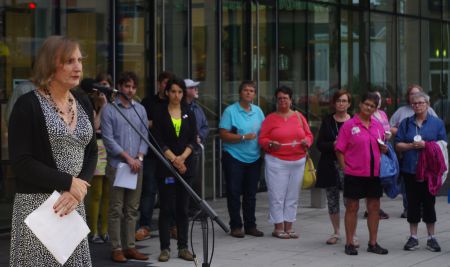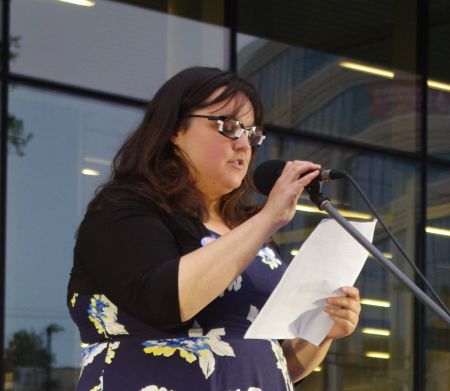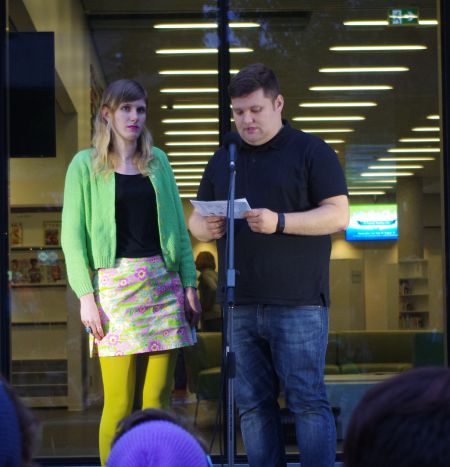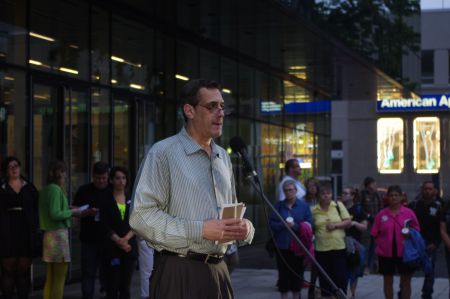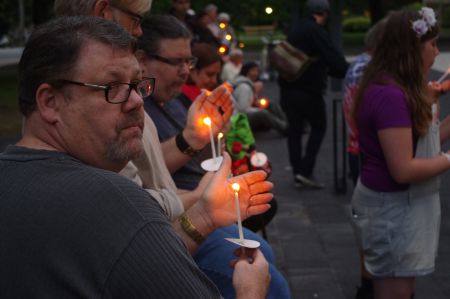KJIPUKTUK (Halifax) -- It’s hard to believe, in 2015, that participants in Halifax’ first Pride March anticipated being beaten. The only question was, would it be the spectators or the police doing the beating. It’s hard to convey how charged with potential violence the early movements toward rainbow rights and gender justice really were.
Few paid the price Harvey Milk did. A long-time activist in the burgeoning gay community of San Francisco, Milk was elected to the city’s Board of Supervisors in 1977. Milk was at the epicenter of epic political battles between establishment San Francisco and a gay community in the Castro neighbourhood rising to national and international prominence. At the height of conflict, in 1978, Milk and Mayor George Moscone were assassinated by a disgruntled former city hall employee opposed to gay-friendly reform. Milk became a martyr in the history of LGBTQI struggles.
In what Milk’s nephew Stuart called “a community gathering against Hate,” fifty thousand San Franciscans held a candlelight vigil in the wake of Milk’s murder. The tradition endures at Pride celebrations worldwide.
Nearly forty years after the murder of Harvey Milk, those who broke ground in rights recognition are aging, whole queer networks have been lost to AIDS, and our contemporary history has no less struggle, only of a different kind.
How does a candlelight vigil bring these streams together, or does it even try?
The International Candlelight Vigil, a signature Halifax Pride event, openly embraced the challenge.
Attended by a record crowd of one hundred people on Monday night in front of the Central Library, the event featured a roster of speakers, each addressing a dimension of loss at an event promoted (in the Pride guide) to “Help us honour those who have passed.” Importantly, the event followed a screening of The Times of Harvey Milk, which provided a rich context for the event.
Grand Marshall of the Pride Parade, activist Kate Shewan spoke of the particular dangers facing trans and gender non-conforming people, from high suicide and self-harm rates, discrimination in housing and employment, poverty and its personal challenges, and significantly, the high rates of gendered violence experienced by the community. Speaking frankly of high and low profile cases of suicide and murder, Shewan emphasized the intersection of racism and poverty in the incidence of gendered violence directed to trans people. “We need to do better,” she pleaded, “because the status quo is killing us.”
Following Shewan, long-time Youth Project staffer, Sheena Jamieson, offered a touching, personal tribute to Youth Project founder, Leeann Wichman, who will be honoured in this year’s empty convertible, a tribute added to the Halifax Pride parade this year to honour long-time activist Raymond Taavel, murdered on Gottingen Street in 2012 while trying to break up a fight.
Laura Cannon and James Boyle, on behalf of the Rainbow Refugees Association, spoke of the work the Halifax group has done to help LGBTQI refugees from Iran who have relocated here, along with six government-sponsored refugees and a woman from Gambia. Internationally, homosexuality remains illegal in 75 countries, eight of which impose the death penalty. The many hardships and obstacles faced by refugees worldwide are only amplified, Boyle reminded the crowd, for those within the rainbow’s arch.
Keynote speaker Stuart Milk spoke briefly of the work the Harvey Milk Foundation does worldwide to promote LGBTQI rights and acceptance, and to assist those who are persecuted for their sexuality or gender. His thanks to the US State Department for its overseas assistance to the Foundation explained the corporate sponsorship of the event by the US Consulate General for Halifax – a partnership that seemed strange, on paper.
Milk spoke to the international and intersectional nature of LGBTQI rights reform, and pointedly noted for the mostly white gathering, “We are not here for the LGBTQI people who look like us”. Showing more understanding than the typical out-or-country guest speaker of the peculiar uniformity and inertia of Nova Scotian culture, Milk repeated his closing statement three times, exclaiming, “The fact that we are different is our strength!”
![Candle lit at the Halifax Pride International Candlelight Vigil, Monday, July 20, 2015. [All photos: L. Shepherd] Candle lit at the Halifax Pride International Candlelight Vigil, Monday, July 20, 2015. [All photos: L. Shepherd]](../../sites/mediacoop.ca/files2/mc/imagecache/page450/imgp4994.jpg)
